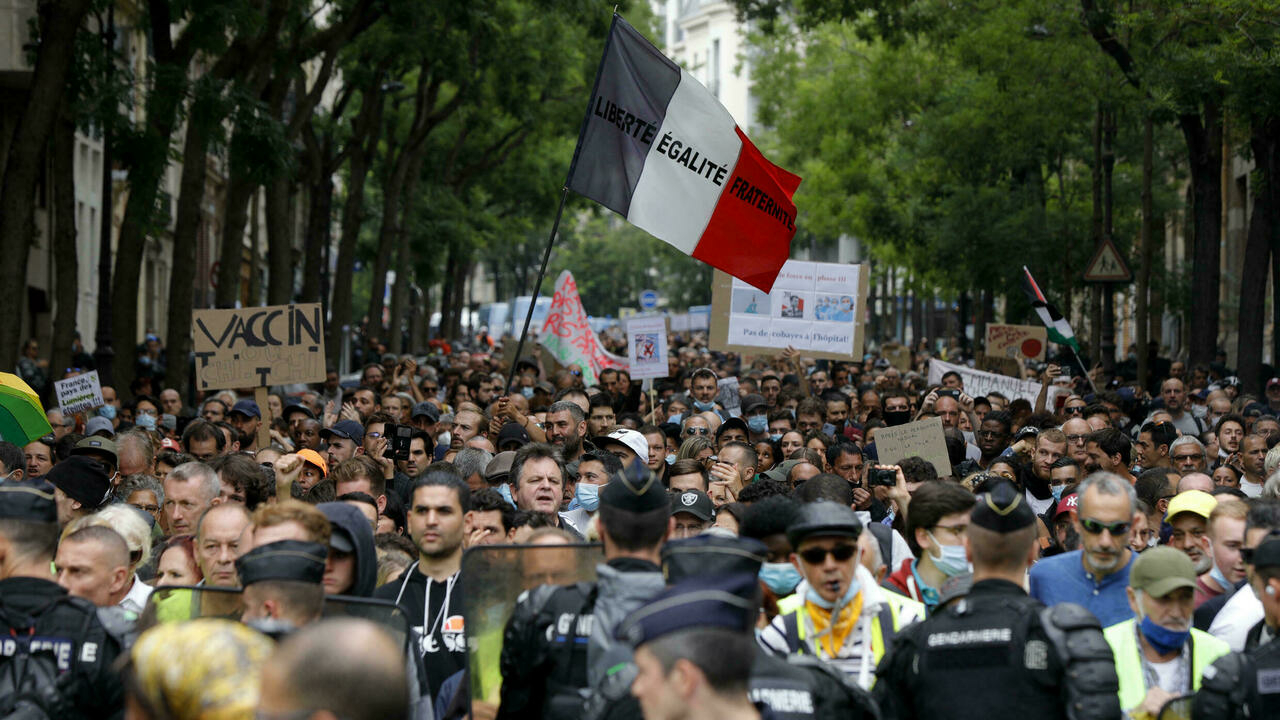Conspiracy theories fuel French opposition to Covid-19 ‘health pass’

More than 100,000 people rallied across France on Saturday to protest President Emmanuel Macron’s plans to require a Covid-19 “health pass” to access public places such as cafés and cinemas starting next week. In addition to traditional concerns about curtailed civil liberties, conspiracy theories have fuelled the opposition to making proof of vaccination obligatory.
Starting July 21, a health pass (pass sanitaire) will be needed to access any of France’s leisure and cultural venues serving more than 50 people, including cinemas and museums. From the beginning of August, the pass will be required on any long-distance public transport, in shopping centres or at cafés and restaurants – including on France’s famed outdoor terraces.
The pass must either include the QR code that proves someone has been fully vaccinated in France or results from a negative PCR or antigen test taken in the previous 48 hours.
France’s Covid-19 infection rate has rebounded alarmingly as the more contagious Delta variant has spread, with the average number of new cases confirmed per day soaring to nearly 11,000 from fewer than 2,000 in late June. The uptick prompted Macron to announce the health pass restrictions on July 12.
‘Too far’
But the move has provoked furious opposition among many in France: some 137 rallies took place across the country on Saturday, gathering nearly 114,000 demonstrators (including 18,000 in Paris), according to the interior ministry.
Many appeared to have taken to the streets out of a libertarian belief that obliging people to be vaccinated if they want to access public venues and activities is an infringement on their basic rights. “In no way does a president have the right to decide on my individual health,” one Paris protester, who gave her name as Chrystelle, told Reuters.
Lucien, a young shop manager demonstrating in Paris, told AP he was by no means an “anti-vaxxer” but that the state should not effectively coerce people to get inoculated. “The government is going too far,” he said.
Some mainstream politicians have echoed these arguments. François-Xavier Bellamy, a prominent young MEP for the conservative Les Républicains party, and Loïc Hervé, vice-president of the Senate’s Centristes bloc, penned a joint opinion piece in Le Figaro this week in which they laid out their reasons for opposing the measure.
“Opposing the health pass does not make someone an anti-vaxxer,” they wrote. The “essential problem” with the pass is that, “for the first time in our history, people will have to present a document in order to do the most simple, ordinary things”.
Extremes on both sides
But most of the political opposition to the health pass has come from extremes on both sides of the political spectrum. Macron’s plans mark a “backward step for personal freedoms”, said leader of the far-right National Rally (Rassemblement National or RN) party, Marine Le Pen, earlier this week. The health pass is an “abuse of power”, thundered Jean-Luc-Mélenchon, leader of the extreme-left France Unbowed (La France Insoumise or LFI).
LFI firebrand François Ruffin went further on Friday as he urged people to rally, characterising the health pass as a means of “humiliation” coming from an “absolute monarchy” in the form of Macron’s government. Florian Philippot, Le Pen’s former right-hand man and leader of the right-wing populist Les Patriotes party, declared ahead of Saturday’s protests that they would demonstrate the “power of the people” in the face of a “disgrace”.
Various populists have argued against the health pass on civil libertarian grounds, avoiding anti-vax statements. But many of Saturday’s protesters thought differently.
Tellingly, when Philippot was addressing the Paris rally and introduced a man called Benjamin onto the stage, saying, “He got vaccinated, but that was his choice,” there was an awkward moment of hesitation in the crowd, Le Figaro reported. It then erupted into cheers when Philippot said, “But he’s against the health pass!” as Benjamin ripped up his vaccination certificate.
Embedded in the crowd, Le Figaro’s reporter repeatedly overheard conspiracy theories such as that the pandemic “was orchestrated in advance” and “it’s all to make money for the laboratories”. When Richard Boutry – a former France Télévisions journalist who now tours the country propagating conspiracy and anti-vax ideas – arrived on the scene, many demonstrators chanted his nickname: “Ricardo! Ricardo!”
“We’re members of the Resistance; you’ve only just go to look at what happened under Vichy – one minute different people have different rights, the next …” a demonstrator told Le Figaro’s reporter – one of several comparisons he heard to the Nazi Occupation.
On Friday night, a vaccination centre in rural southeastern France was broken into and vandalised with the Cross of Lorraine (a symbol of the French Resistance) and graffiti saying “Vaccination = genocide” and “1940”, presumably a reference to the year the Vichy regime was founded.
“I feel there were likely fewer avowed and strident civilian libertarians than there were conspiracists at these demonstrations,” said Andrew Smith, a professor of French politics at the University of Chichester.
French anti-vaxxers likening themselves to the Resistance constitutes a “worrying manipulation of history”, he continued.
“It also shows something very specifically French about the anti-vax movement in the country. That language about defeat, collaboration and Nazism – it’s a big difference from what you see in Anglo world, where Nazis are, of course, often the bad guys many people evoke but it’s much more abstract.”
Rise of QAnon
Polling data shows that French anti-vax sentiment has waned as the vaccination rollout proceeded in the first half of the year. Nevertheless, an OpinionWay survey published in May found that 20 percent of French adults would turn down a jab while 13 percent are undecided.
The French Academy of Medicine has said the country needs 90 percent of its adult population to be fully vaccinated to receive herd immunity and defeat Covid-19.
The popularity of French pseudo-documentary “Hold-Up” shows that Covid disinformation has a big audience in this country. Endorsing an array of debunked claims, the online film got more than 2.5 million views after its release in November, with several famous faces including iconic actress Sophie Marceau sharing the video.
It is in this context that the QAnon conspiracist phenomenon – which weaves falsehoods about the coronavirus into a broader tapestry of fantasy, including warning of a worldwide cannibalistic cabal of paedophiles – has grown in France over the past year, boosted by French-language misinformation websites such as DéQodeurs and FranceSoir (a renowned broadsheet in the years after the World War II, which closed in 2012 before re-emerging two years ago as a conspiracist Internet publication).
READ MORE: ‘Stakes are high’ as QAnon conspiracy phenomenon emerges in France
A boon for Macron?
Nevertheless, conspiracy theories remain a marginal force in French society. “Most people in France see that hard work and sensible policies are the route out of the pandemic, not conspiracies,” Andrew Smith said.
It seems most French citizens see Macron’s plan as one such sensible policy: An Ipsos-Storia Sterna poll published on Friday showed that 60 percent of French people favour the health pass and the accompanying plan to oblige all health workers to be vaccinated.
And the pass may well prove to have been a politically expedient move for Macron ahead of the presidential election next April. “When Macron made his announcement on Monday, plenty of people saw it as partly a public health measure but also a campaign message for the presidential elections,” observed Paul Smith, a professor of French politics at Nottingham University.
Macron’s health pass could be especially effective at winning over moderate voters who see him charting France a path out of the Covid nightmare and see themselves as part of a silent majority standing against both the far left and the far right, said Andrew Smith: “This policy changes the terrain of the battleground. The traditional right- and left-wing parties Les Républicains and the Parti Socialiste will not and cannot challenge Macron on taking a measured, sensible approach to the pandemic.”
“You don’t win the presidency through 117,000 people spread across the streets of France,” Andrew Smith observed. “You win through sensible, evidence-based policy to end the pandemic and restart the economy.”


